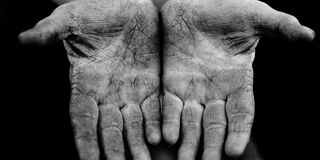Help! People make fun of me for having rough hands

Rough hands can be due to an inflammatory skin condition, says expert.
What you need to know:
- To manage dry hands, use a moisturising lotion or cream several times a day
- You can also take a lot of water
- In addition, reduce stress
Dr Flo,
I have had a problem with my palms since primary school. I am only 22, but my palms are rough yet I do not do hard jobs. I have been teased because of my rough hands since primary school. What could be the problem?
Steve
Dear Steve,
Rough palms that are not due to calluses from work conditions may be caused by having excessively dry hands or from having an inflammatory skin condition like eczema and psoriasis. To manage it, use a moisturising lotion or cream several times a day, take a lot of water, reduce stress, apply petroleum jelly when going to sleep then cover your hands with soft gloves or socks. If you need to touch water frequently, consider wearing gloves. It would also be beneficial to visit a dermatologist for examination and if you are found to have a skin condition, then you will be put on the appropriate treatment.
Dr Flo,
I always feel pain in my left knee after an evening of soccer. I only feel a little pain when I am walking. But, the pain is even sharper if I climb the stairs. The pain lasts for about five to six days then subsides significantly. After another evening of soccer, the pain returns. What might be the cause and what can I do to treat it? Any assistance would be greatly appreciated.
Dan
Dear Dan
The knee pain could be due to strain and inflammation of the tissues of the knee when playing soccer. It could also be the result of an injury you suffered, or it can be due to an underlying problem in the knee like arthritis, gout or osteoporosis. The knee is the largest joint in the body and it is made up of bone, cartilage, joint fluid (synovium), some discs called menisci and the bones are connected by ligaments, tendons and muscles. Any of these could be damaged and cause the pain. This could be due to a tear in the menisci or the ligaments, sprain, strain or inflammation of the ligaments and tendons or inflammation of the sacs of fluid that cushion the knee (bursitis). Serious injury can also cause joint dislocation or fracture of the bones.
To manage this, you need to rest the knees and not play soccer for long, use a knee support or a knee brace or use hot or cold packs when there is a lot of pain. You would also benefit from pain killers and physical therapy. You also need to visit an orthopaedic specialist and have some tests like an MRI scan of the knee done so that a proper diagnosis can be made. If there is an underlying problem, like gouty arthritis, you will be started on the appropriate treatment.
Damage done to the knee due to use over time or due to overuse cannot be reversed, but it can be managed. The most important thing is to prevent further damage by avoiding overuse.
Dr Flo,
We got married a while back, but we do not have a child yet.
TM
Dear TM,
It is not automatic for someone to conceive as long as they are not using any contraceptives, even though there is nothing wrong with either of the partners. In fact, medically speaking, concerns about fertility arise after one year of having regular unprotected sex.
About 15 per cent of couples are unable to conceive after one year of trying. Of these, a third of the time, the problem is in the woman, a third of the time, the problem is in the man, and in the other third, both partners have a problem, or no problem can be found at all.
In women, infertility can be caused by abnormal ovarian function, hormonal disorders, fallopian tube obstruction and abnormalities of the uterus. Some of the factors that can increase the risk of infertility are alcoholism, smoking, obesity, severe weight loss, extreme physical or emotional stress, and being over 35 years of age.
In men, infertility can be caused by a disruption of the function of the testicles, ejaculatory dysfunction, hormonal disorders and genetic disorders. Some factors that can increase the risk of infertility include diabetes, alcoholism, smoking, use of steroids, injury to the testicles, being overweight or as a consequence of exposure to some drugs, toxins or radiation.
If you have been unable to conceive after one year of trying, please visit a gynaecologist, if possible, together. Check-ups for the woman include a pelvic ultrasound to check the pelvic organs, a hysterosalpingogram (HSG) to check the fallopian tubes and a hormone profile to check the hormones. The man may need to have a seminalysis and a hormone profile done, as necessary. Treatment is given, depending on what is found. For example, the woman may be given medication to facilitate ovulation or to control hormones, she may need surgery if there is scarring, endometriosis or the fallopian tubes are blocked. The man may also be put on medication. You may also benefit from assisted conception through intra-uterine insemination or in vitro fertilisation if other measures do not succeed.
Send your medical questions to [email protected] for expert advice


